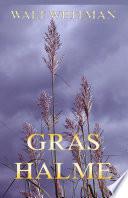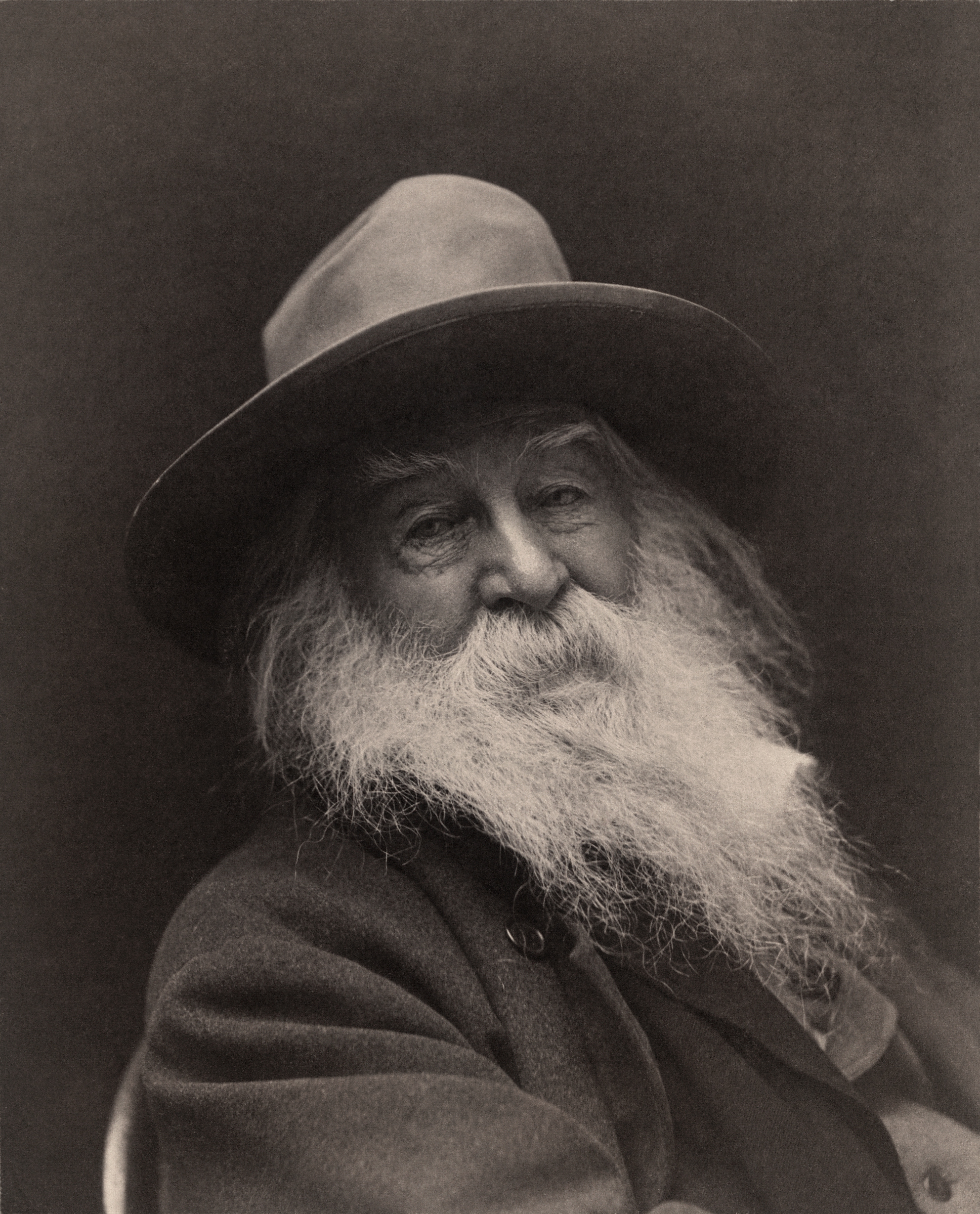Werk

Grashalme
Walt WhitmanWalt Whitman Berühmte Zitate
Fälschlicherweise zugeschrieben. Es stammt aus dem Gedicht "The road not taken" von Robert Frost
Tagebuch, 1876
"What worse - what more general malady pervades each and all of us, our literature, education, attitude toward each other, (even toward ourselves,) than a morbid trouble about seems, (generally temporarily seems too,) and no trouble at all, or hardly any, about the sane, slow-growing, perennial, real parts of character, books, friendship, marriage - humanity's invisible foundations and hold-together?" - The Lesson of a Tree. September 1. Prose Works 1892. Volume I Specimen Days. Edited by Floyd Stovall. © New York University 1963
Zitate über Leben von Walt Whitman
Grashalme, Inschriften, Das Buch, Übers. v. Wilhelm Schölermann, Leipzig: Eugen Diederichs, 1904, www.zeno.org http://www.zeno.org/Literatur/M/Whitman,+Walt/Lyrik/Grashalme+(Auswahl)/Inschriften/Das+Buch
Original engl.: "[(As if any man really knew aught of my life, //] Why even I myself I often think know little or nothing of my real life, // Only a few hints, a few diffused faint clews and indirections // I seek for my own use to trace out here." - When I Read the Book. Inscriptions - gutenberg.org http://www.gutenberg.org/files/1322/1322-h/1322-h.htm#2H_4_0066
Zitate über die Nacht von Walt Whitman
Walt Whitman Zitate und Sprüche
Tagebuch, 1877
Original engl.: "Sweet, sane, still Nakedness in Nature! - ah if poor, sick, prurient humanity in cities might really know you once more!" - A Sun-Bath - Nakedness. Sunday, Aug. 27 [1876]. Prose Works 1892. Volume I Specimen Days. Edited by Floyd Stovall. © New York University 1963
Wir zwei Knaben, Grashalme, Leipzig 1904, S. 140 zeno.org http://www.zeno.org/nid/20005903602
Original engl.: "Misers, menials, priests alarming, air breathing, water drinking, on the turf or the sea-beach dancing, // Cities wrenching, ease scorning, statutes mocking, feebleness chasing, // Fulfilling our foray." - We Two Boys Together Clinging. Calamus - gutenberg.org http://www.gutenberg.org/files/1322/1322-h/1322-h.htm#2H_4_0066
Gesang von mir selbst, in: Grashalme. Übers. v. Wilhelm Schölermann, Leipzig: Eugen Diederichs, 1904 zeno.org http://www.zeno.org/nid/20005903386
Übersetzung: .o
Original engl.: "Of all portraits of me made by artists I like Eakins's best: it is not perfect but it comes nearest being me." - 1888, zitiert in: Alice A. Carter, "The Essential Thomas Eakins", H. N. Abrams : New York 2001, ISBN 0-8109-5830-9, S. 84
Walt Whitman: Zitate auf Englisch
While consistently attributed to Whitman, this popular motivational quote has no source. It is occasionally listed as occurring in Leaves of Grass, but the closest phrase found in that collection is "Be not curious about God."
Disputed
Variante: Be curious, not judgmental.
“Keep your face always toward the sunshine – and shadows will fall behind you.”
This has become attributed to both Walt Whitman and Helen Keller, but has not been found in either of their published works, and variations of the quote are listed as a proverb commonly used in both the US and Canada in A Dictionary of American Proverbs (1992), edited by Wolfgang Mieder, Kelsie B. Harder and Stewart A. Kingsbury.
Misattributed
“I do not ask the wounded person how he feels, I myself become the wounded person.”
Quelle: Song of Myself
Variante: What is that you express in your eyes? It seems to me more than all the words I have read in my life.
“I am large, I contain multitudes.”
Leaves of Grass
Variante: I contradict myself. I am large. I contain multitudes.
“I sound my barbaric yawp over the roofs of the world.”
Song of Myself, 52
Bartlett's Familiar Quotations, 10th ed. (1919)
The Sleepers, 7
Bartlett's Familiar Quotations, 10th ed. (1919)
Quelle: Leaves of Grass
“I discover myself on the verge of a usual mistake.”
Quelle: Song of Myself
Complete Prose Works (1892), III. Notes Left Over 3. Ventures, on an Old Theme, p.324 http://books.google.com/books?id=UJA1AAAAMAAJ&pg=PA324
Kontext: If the United States haven't grown poets, on any scale of grandeur, it is certain that they import, print, and read more poetry than any equal number of people elsewhere — probably more than the rest of the world combined.
Poetry (like a grand personality) is a growth of many generations — many rare combinations.
To have great poets, there must be great audiences too.
"Talk to an Art-Union (A Brooklyn fragment)" http://www.aol.bartleby.com/229/4011.html (1839); later delivered as a lecture at the Brooklyn Art Union (31 March 1851) and printed in the Brooklyn Daily Advertizer (3 April 1851)
Kontext: It is a beautiful truth that all men contain something of the artist in them. And perhaps it is the case that the greatest artists live and die, the world and themselves alike ignorant what they possess. Who would not mourn that an ample palace, of surpassingly graceful architecture, fill’d with luxuries, and embellish’d with fine pictures and sculpture, should stand cold and still and vacant, and never be known or enjoy’d by its owner? Would such a fact as this cause your sadness? Then be sad. For there is a palace, to which the courts of the most sumptuous kings are but a frivolous patch, and, though it is always waiting for them, not one of its owners ever enters there with any genuine sense of its grandeur and glory.
I think of few heroic actions, which cannot be traced to the artistical impulse. He who does great deeds, does them from his innate sensitiveness to moral beauty.
"Talk to an Art-Union (A Brooklyn fragment)" http://www.aol.bartleby.com/229/4011.html (1839); later delivered as a lecture at the Brooklyn Art Union (31 March 1851) and printed in the Brooklyn Daily Advertizer (3 April 1851)
Kontext: It is a beautiful truth that all men contain something of the artist in them. And perhaps it is the case that the greatest artists live and die, the world and themselves alike ignorant what they possess. Who would not mourn that an ample palace, of surpassingly graceful architecture, fill’d with luxuries, and embellish’d with fine pictures and sculpture, should stand cold and still and vacant, and never be known or enjoy’d by its owner? Would such a fact as this cause your sadness? Then be sad. For there is a palace, to which the courts of the most sumptuous kings are but a frivolous patch, and, though it is always waiting for them, not one of its owners ever enters there with any genuine sense of its grandeur and glory.
I think of few heroic actions, which cannot be traced to the artistical impulse. He who does great deeds, does them from his innate sensitiveness to moral beauty.
